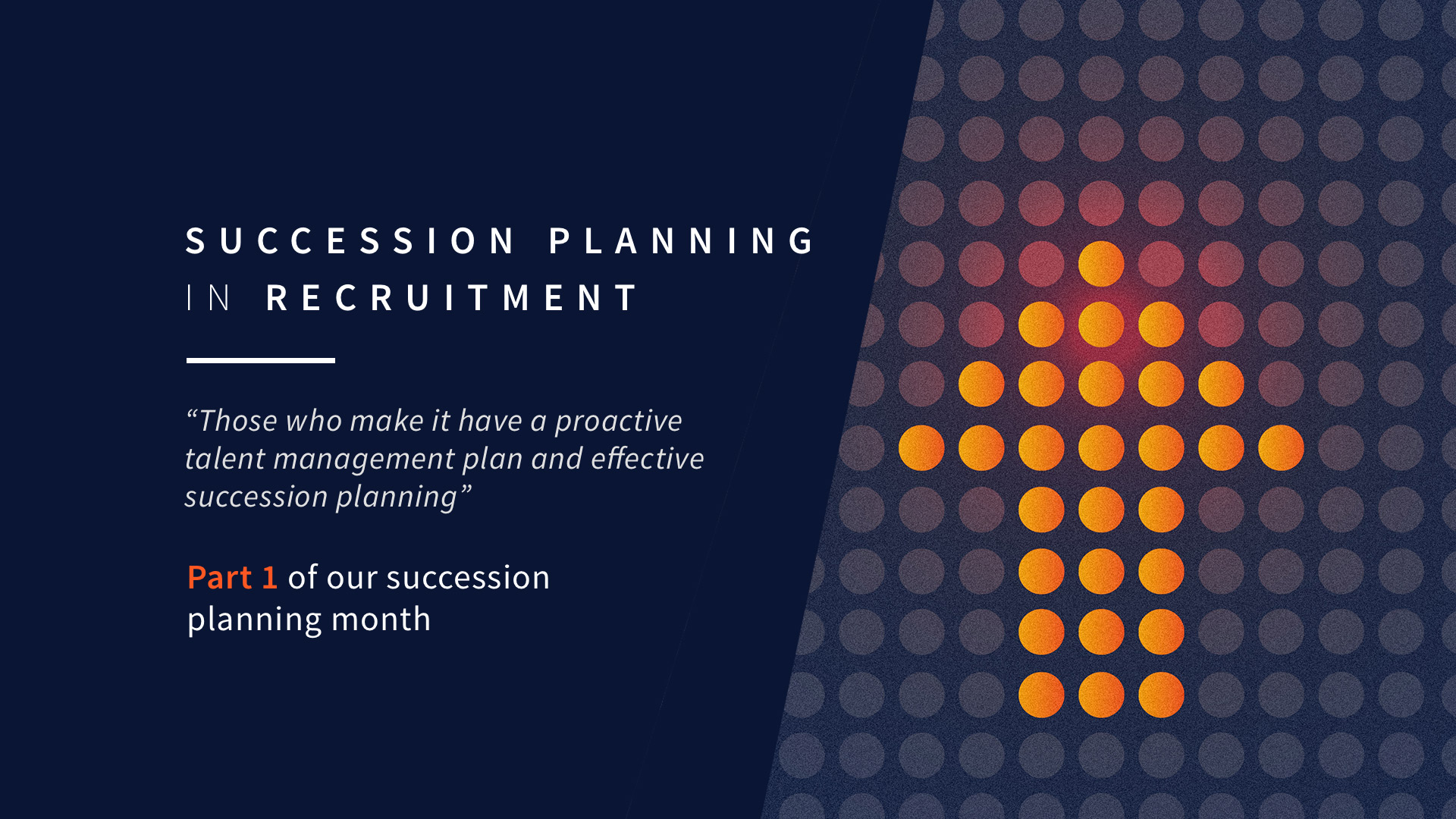Part 1 of our Succession Planning month, we look at what role succession planning plays in your recruitment business, why, how & who should it be for.Welcome to the first blog in our succession planning month. This is part of a brand new content strategy we’re starting. We’ll be covering some of the hottest topics in recruitment and leadership each month, trying to really dig in deep and produce valuable content you can use in your recruitment business.
In the last 15 years, The Recruitment Network has worked with hundreds of recruitment businesses with aspirations of growth. Without exception those who make it have a proactive talent management plan and effective succession planning. As a people dependant business, our performance and growth comes from having the right people achieving, with the appropriate strength with depth of management to engage and inspire performance and loyalty.
What is succession planning?
A succession plan in the simplest sense, is a plan to map out successors for business critical roles moving forward. It’s a plan for the future which should reflect and be aligned to the business plan.
Succession planning is achieved by identifying:
1: ‘Business Critical Employee’s’ – Consultants, Resourcers, Marketing, Internal recruitment etc – required as a business grows and evolves. 2: ‘Successors’- Roles where it makes sense to have a suitably trained successor or someone who needs to be developed to take on the responsibilities of a higher role, respectively.
Any growing recruitment business requires key support functions and a management team (billing and non billing) as it goes through different growth phases. Identifying when and at what stage these roles will be required should be part of the business plan.
A strong succession plan will have a strong and clearly defined agenda which will contain a roadmap to train and lead the successor to a point where they’ll be able to step into the shoes of the business critical role. To get the most out of our succession plan it’s recommended you have at least a 3 year plan that will deal with different eventualities, which is constantly kept updated.
Why should we have a succession plan?
In a study by CareerBuilder, 27% of businesses cited that they had been adversely affected by poor succession planning. That certainly reflects our experience (except we would suggest it’s higher!). In the same way successful succession planning enables growth, equally poor succession planning means we hit a ceiling, or worse case go backwards as the team become disengaged and disillusioned.
Why it matters:
– Staff turnover is a business reality and the impact of lost productivity and sales through reactive recruitment and promotion is costly – Effective succession planning negates that risk. Notice periods tend to be around 4 weeks, maximum 12 weeks, generally speaking, which is not much time to plan or train a successor in a business critical role. For the successor to take over any key role or replacement and to make a success of it would be a difficult task without prior training and preparation.
– External recruitment is a risk – Promoting your known employees and having them ready reduces that risk.
– Engaged employees are more productive – Understanding career opportunities and personal development and growth potential matters to them.
Let’s look at a success story – One of our members at The Recruitment Network is particularly proactive when it comes to succession planning and has just employed employee number 60 after 4 years. Every member of the senior management team started out with them as a recruiter. They have not suffered from a single regrettable loss (of talent) and it’s evident when talking to their people that the vision of growth, and the way everybody has mapped out career opportunities in their business plan and the continued investment in them has had a significant impact on engagement and retention. Succession planning enables profitable growth. Personal development and growth matters to employees.
Personal development and growth matters to employees.
Who should a succession plan be for?
It clearly depends on what stage the business is at. Let’s look the example of a start- up:
A start up recruiter might have a 5 year plan to get to a Net Fee Income of £3.5m and a headcount of 30.
To deliver that strategic ambition is going to require some resource planning and succession planning. Starting the business probably came from one or two people with the ambition to grow a successful business. The resource planning if done properly will map out the roles needed moving forward which will include:
- Additional consultants
- Senior consultants
- Team Leaders or billing managers
- Non Billing managers
- An MD
Equally as the business gets bigger it might require support roles and functions to help the consultants focus and deliver and allow the managers to manage, involving such roles as:
- Resourcers
- Marketing Execs
- Internal recruiters
- Internal training
- Administration
- Office Managers
- Finance and accountants
- Compliance and Bid Managers
The roles required to deliver the 5 year plan can be mapped out and reviewed every year. Having that clarity as a business leader means we can communicate and plan for the future, proactively designing the succession plan in line with the growth plans
While the larger corporate recruiter can offer more opportunity than the typical SME recruiter by the nature of its size, the succession plan is a must have for any size business who recognises that staff turnover is a reality, businesses evolve organisationally, leadership and management is key to growth, and employee engagement matters and can be positively influenced by a succession plan.
Succession Planning and Talent Management Programmes – what’s the link
Most recruitment businesses invest in developing the team using external or internal trainers, blending face to face or online support with coaching, support and mentoring from the line manager or other experienced colleagues.
If you want to grow your business you’d better grow your team; is an obvious truism. So how does this tie in with succession planning? Well inevitably as business growth (and staff turnover) throws up new roles and new opportunities, if we’ve developed people with the skills and confidence to step up, we create a win-win. They get progression and all that comes with it, you get growth and seamless evolution without getting knocks on productivity.
Let’s give you an example of how the two link. Within The Recruitment Network membership most of our members have strategic and ambitious growth plans. Most also have individuals who have the ambition and potential to do a bigger role. Most know and recognise having strength and depth of management with the right leadership skills team will:
- Maintain high levels of performance across the team
- Enable the business leader to operate more strategically
- Keep key individuals motivated and engaged as their career progresses
We have 3 options in this scenario – we can recruit externally to build that management team, we can promote from within or we can do a blend of both. I’d strongly recommend against the first option for obvious reasons. The second two options make sense and the more we can do the 3rd option the better.
Succession planning requires us to think ahead and understand the roles we’ll have to fill, talent development programmes equip the existing team with the confidence and ability to fill those roles. We recently launched the Trailblazer programme for emerging leaders and it’s proved hugely popular with owner managers and senior decision makers within recruitment businesses because they know that the succession planning without effective talent development won’t work. Equally talent development without succession planning for the future means we can’t offer the team an engaging and clear picture of opportunity. They go hand in hand.
“I’ve been on many development programmes – This is the most engaging, thought provoking and gives you a clear plan about how to take great ideas and put them into action. Inspirational, like minded people sharing years of Recruitment Experience. Jump on board, give yourself this opportunity to be the best version of yourself you can be. What I loved about today was that I can apply the ideas and transform my team’s performance. I’m so excited about my job because of today!” – Trailblazer Member
– Find out more about our Trailblazer programme
Why don’t more companies have one in place?
Time and expertise are typical causes with recruitment businesses, particularly those SME’ where managers work on the business and don’t have the inhouse resource to build a succession plan. Equally, they don’t know how or haven’t the internal expertise to make it happen. In next week’s blog we ask (and answer) the question of ‘Internal vs External Succession Planning with the following week covering how to build a great succession plan, then finishing the month looking at what happens when it goes wrong.
Keep up to date with our upcoming scheduled content by subscribing below.
Share :



